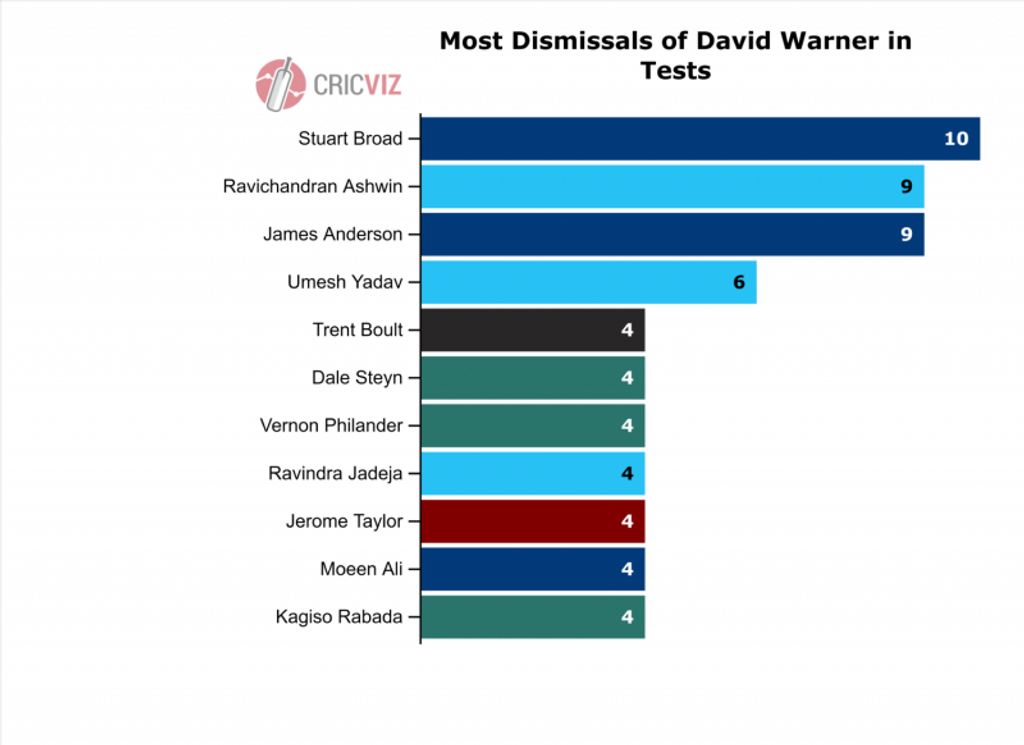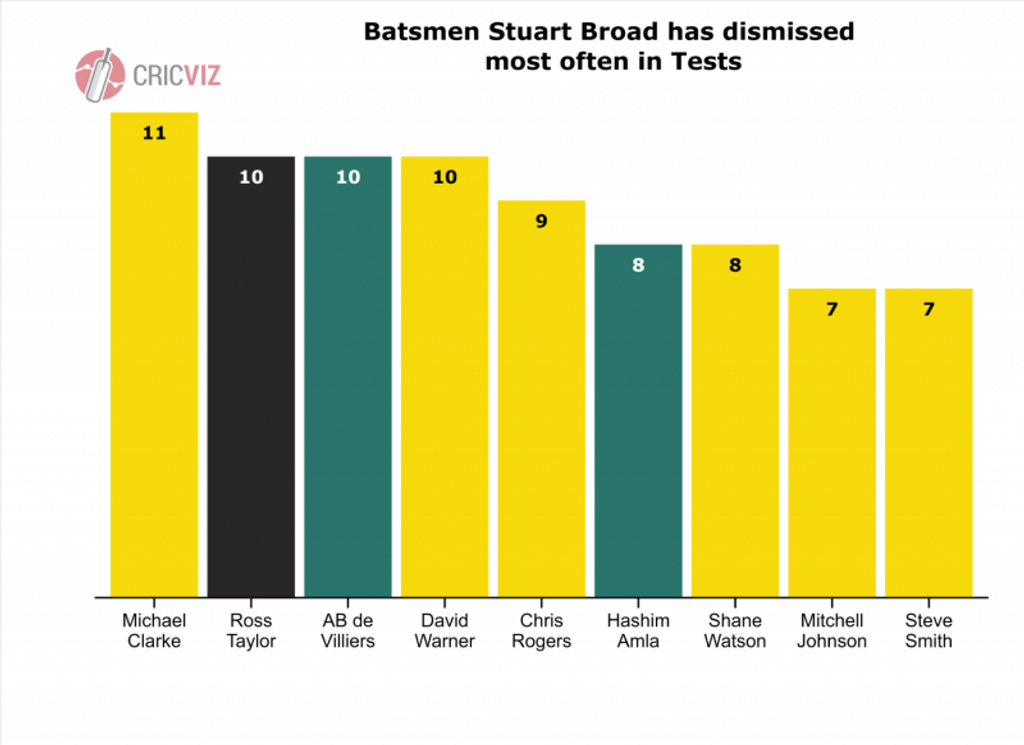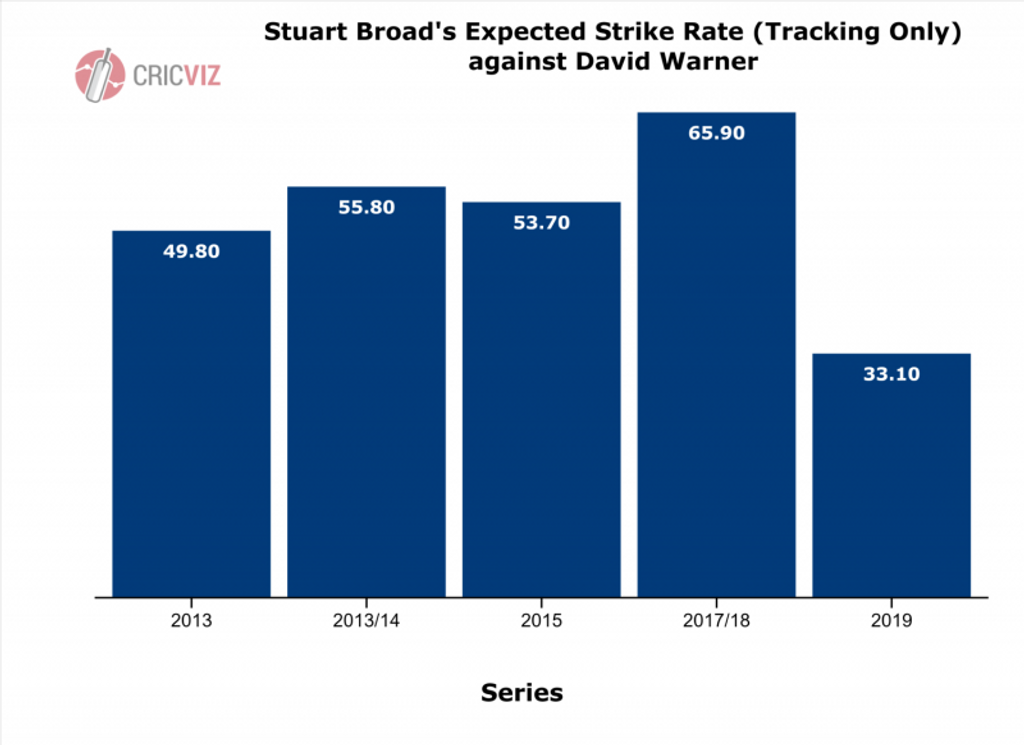
CricViz’s Ben Jones analyses the battle between two top class competitors.
Ben Jones is an analyst at CricViz.
It’s a relatively select and elite group of players who’ve appeared in each of the last five Ashes series; James Anderson, Joe Root, Jonny Bairstow, Nathan Lyon, Steve Smith, Stuart Broad, and David Warner. To be involved in such a high-profile series for such a long period of time is a fair indicator of ability. Staying in the system for that long shows that you’ve got something about you.
What it also allows is for long, fluctuating rivalries to build up. Return series, the challenges of touring and the comforts of home, the varying contexts; all of these things contribute to the texture of great contests. So it is with Stuart Broad and David Warner.
Before this series, the rivalry wasn’t exactly well balanced. Ahead of this summer, Broad’s record against Warner was straightforwardly poor. Five dismissals at an average of 65.60 made pretty grim reading, little indication that Broad was going to be able to limit the effectiveness of a man in extremely good white-ball form. A dominant IPL, a dominant World Cup, looked set to be joined by a dominant Ashes series.
And yet that emphatically hasn’t been the case. Warner has been almost unable to play Broad, even to lay bat on ball, and has been dismissed five times in seven innings at his hand. Four in 10 of the deliveries Broad has sent down to him have brought a false shot, an edge or a miss almost every other ball. Having been tilted so far in favour of the batsman, the contest has swung back in favour of the bowler, and dramatically so.

One noticeable technique Warner has adopted is batting further down the track; you would imagine that this is a decision taken as a means of countering the swing which is so common in England, the swing which has caused Warner so much trouble in the past. This series, he’s batting almost 40cm further down than he has previously done in England. That is a pronounced difference, a concerted effort to change his technique and adapt to the specific challenge of batting in this country.

However, it does seem to have affected his ability to attack the ball. He has attacked just 11 per cent of the deliveries he’s faced in this series, less than half of the 30 per cent he managed in 2015, and still well below the 22 per cent he recorded in 2013. Perhaps, by batting further down the track, Warner has restricted his ability to punish width with quite the same efficiency. Perhaps it’s affected his instinctive understanding of the geometry of his own batting, and with it his judgement of which are the good balls to go after. He’s never scored slower in England.
This has been exaggerated by England’s clever strategy against Warner, ensuring they attack him from the correct angle, from the get go. All of the deliveries Broad has bowled to Warner in this series have been from around the wicket. Across his career Warner’s averages against right-arm seamers coming over and round the wicket are actually rather similar (52.10 and 45.78), but England clearly spotted something they wanted to exploit.
However, we shouldn’t just dwell on the negative, because it’s fair to attribute a fair bit of agency to Broad in this particular battle. The deliveries he’s bowled have, fundamentally, been really good balls. The Expected Strike Rate of the balls he’s delivered to Warner would, according to our model, take a wicket on average every 33 balls – that makes his bowling this series the most threatening he’s ever been against Warner.

Broad’s also been very good at not feeding Warner’s strength against the short ball. Just 11 per cent of his bowling to Warner has been pitched further than eight metres from the batsman’s stumps, the lowest figure Broad’s ever recorded against him. Keeping him driving and prodding, in consistently difficult conditions, is a simple and effective plan which Broad has executed very well.
Warner is made of stern stuff, and is precisely the sort of character who’ll see this as an opportunity rather than a tragedy. A defiant century after hitting Broad out of the new ball attack doesn’t feel likely, given his current form, but few would doubt he has the temperament and ability. And the fact that it’s a possibility is evidence of the credit he’s got in the bank, because nobody is suggesting Australia should drop Warner. He’s in for the series, even with Broad licking his lips. The fact that Australia could well win 3-1 and have their second-best batsman (on paper) suffer such a drought is a rather surprising turn of events. For England, their legend getting the better of Australia’s attack-dog could well be consolation only – regardless, the turnaround in fortunes has been remarkable.








